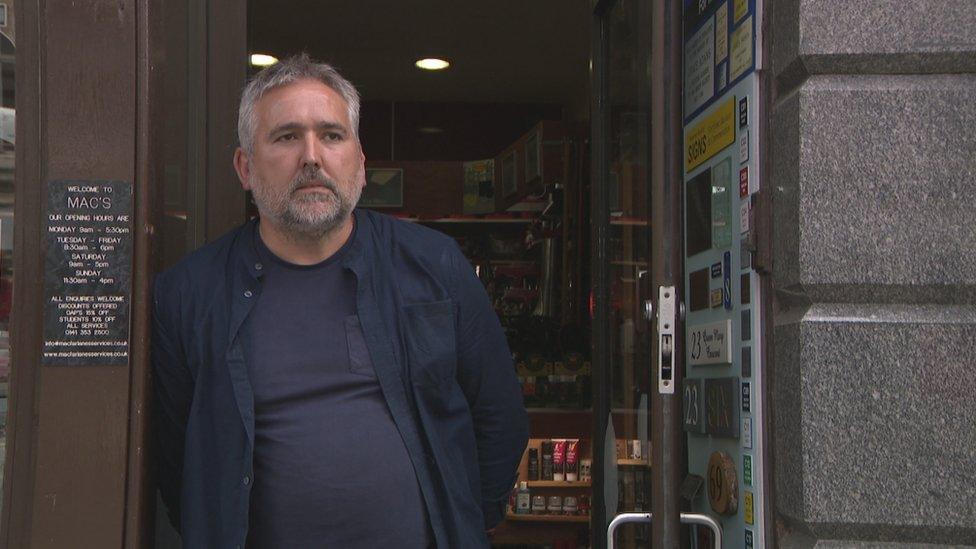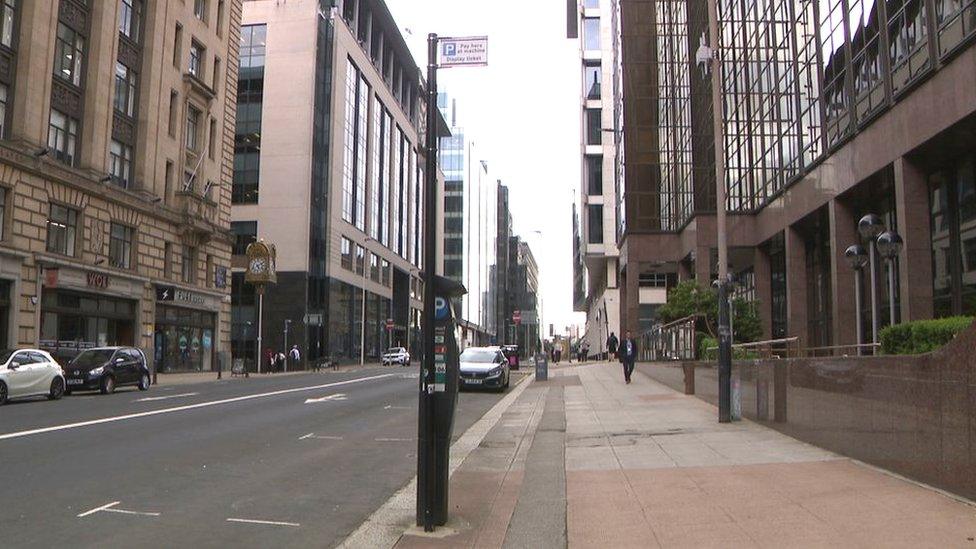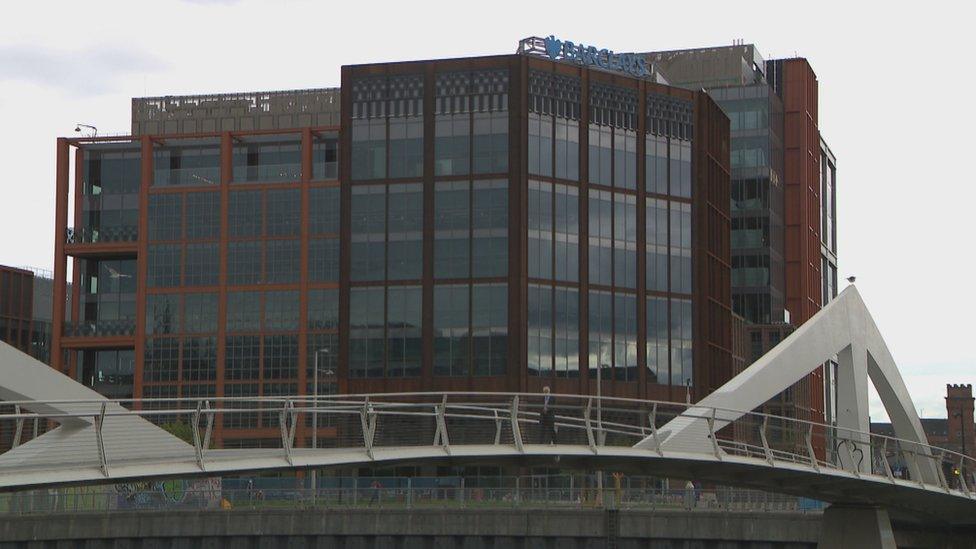What if commuters don't return to city centres after Covid?
- Published

Cobbler George Rogers has seen a reduction in normal trade
30,000 Glasgow workers depend for trade on other Glasgow workers who commute, but they've gone home, and many would prefer to stay there. The city is one of the worst-affected in Britain by the loss of commuters.
Business is calling for government to avoid full support for continued working from home, even after infection restrictions are relaxed.
While city centres lose custom, suburbs and satellite towns are gaining, both in local shops and from new types of flexible workspace closer to home.

"I'm in with the bricks and mortar," says George Rogers. "The machines are here. This is my livelihood. I've got a family to keep. So you soldier on."
For eight years, he has run MAC's, a small repair shop on Glasgow's Sauchiehall Street, now sandwiched between two large, vacated shops with whitewashed windows.
In normal times, three-quarters of his custom would be from office workers, to resole work shoes and mend sporrans for formal events. Scottish Opera looks to him to handle costume repairs.
"It's convenience. That's why we're here," he observes.
For now, it's mainly key cutting and watch batteries.
"If I were to focus on turnover, I wouldn't be here," he says. "I'm not in control. Nobody's in control. I just hope to get through it. With each passing week and with the reduction in normal trade, it becomes more pressured."
He is one of an estimated 30,000 workers in Glasgow city centre who depend on other workers in Glasgow city centre.

The financial district of Glasgow feels "deserted" with cafes and pubs closed
Without Covid, they would be serving drinks, food, coffee and be in shops. But there's little passing trade. Most of those in Sauchiehall Street are schoolkids on holiday, killing time.
The financial district west of Central Station feels deserted. Almost all the cafes and pubs are closed. Those that stay open admit they're struggling.
Building sites remain busy, erecting vast shiny office blocks, which symbolise the city's success in attracting financial jobs.
Barclays represents a great leap south, across the Clyde and its "squiggly" footbridge, with a building near completion for 5,000 workers: one of the banking giant's three global hubs, doubling its jobs in the city.
But will these offices be needed? Will they ever be full? How much space will be required merely for collaboration and teamwork while much of the screenwork is done back at home?
Collaboration space is the emphasis from those redesigning offices for the big return, when and if it comes. They're trying to adapt to a vastly-changed working world.
Sixteen months ago, everyone was sent home. They made it work better than anyone thought possible, and many learned that they prefer it that way, for at least part of the week.

The Barclays building is nearing completion
There's encouragement from the UK government for people in England to return to offices, commuting and urban bustle. The government is reflecting pressure from business, including public transport operators, to head back to normal.
In Scotland, Nicola Sturgeon has been much more cautious, instead encouraging businesses to adapt to longer-term working from home.
Last month, she said a return from August will not be advised, but instead an "appropriate phasing" after entering level zero: "I think many would agree homeworking should be more possible post-Covid than it was before.
"So while recognising a return to the workplace will be right for many, we will encourage continued support for home working where it is possible and appropriate."
Even if the first minister were to encourage a return to offices, there's resistance from many in the workforce, making this a sensitive discussion for bosses who want to see their staff back at their desks. The effect on productivity of the great office exodus is not yet clear, but the corporate concern is that efficiency, productivity and creativity is suffering.
Urban nightlife
The future of city centres is not like the future of hospitality, where government permission to reopen lets businesses spring back to life, meeting pent-up demand to socialise once more. By contrast, commuting has probably changed forever.
This is not what business people, such as George Rogers, want to hear. Glasgow has taken a bigger hit from home-working than any other British city studied by the City for Centres think tank.
It cited data from the end of May suggesting that only 9% of commuters had returned to their workplaces in central Glasgow. Edinburgh was among the next lowest, at 15%.
The number of people in town during the day on weekends was only 56% of pre-Covid levels, reflecting relatively strong shopping numbers compared with commuters.
The hit to weekend nightlife registered 28% of pre-Covid levels. Aberdeen was at only 36%, Edinburgh at 43% and Dundee at 64%.
The same study found that weekday footfall in Glasgow has seen the biggest fall outside London, reaching only 40% of pre-Covid levels by the end of May. The share of pre-Covid spending was healthier, at 77%, but that was fourth lowest of 63 British cities studied.
Hybrid working
Stuart Patrick, chief executive of the Glasgow Chamber of Commerce, explains that the city is harder hit because it has relatively few people living centrally. Of those who normally would, many are students, and many of them went home long ago.
The city's tourism appeal is particularly strong on nightlife, concerts, conferences, exhibitions and sport, all of which have fallen away to nothing much.
Mr Patrick is leading a city centre recovery group, and pleads with the Scottish government to "think very carefully" about the messaging it sends about continued working from home.
"There is a wider economic harm that comes from encouraging homeworking, not just of the 30,000 traders depending on footfall from office workers, but for the companies and offices themselves, and particularly for young people, trying to learn and develop.
"That is almost impossible to do on Zoom or Teams. You need face-to-face engagement with the rest of the team."

Stuart Patrick says there is a "wider economic harm" from homeworking
He continues: "Around complex projects, innovation and creativity, it really damages the ability of companies to invest in the long-run.
"It's an obstacle to progress. We know the majority of employers will offer hybrid working, but we'll see if that sticks, or over time if we'll discover what it was that made the office such an important part of a productive, modern economy."
The chambers chief looks to some offices being given new purposes, with demand for wet or dry laboratories. Older buildings could be converted into homes or hotels, for which he says there needs to be consideration of a return to tax incentives.
Between 2007 and 2017, Mr Patrick observes those had a lot to do with building up the city's hotel capacity and renovating older buildings.
"Also for hard-pressed retail and hospitality, we have to ask questions about business rates," he adds. "They're based on expectations of demand embedded in rental value, so if we're expecting less footfall, we should ask how quickly the rates bill should shift to reflect that."
Staycation boom
The flipside of the struggle for city centres is the opportunity for suburban and town centres closer to people's homes. There's less Scottish data, but Centre for Cities research reflects the growth in spending in smaller English cities where people live but are less likely to work. It is significantly above pre-Covid levels.
When bars and restaurants were allowed to reopen, there's evidence that trade picked up fastest in satellite towns and on suburban streets. Convenience stores have done well.
It's probable that people feel safer when closer to home. And while working at home, they're using their local shops and cafes to get a change of view.
Ayr is the kind of town that's doing well out of this. The staycation boom is bringing many people down to the seaside, while Brian Williamson, owner of WMA business centres, tells me of a different type of post-Covid client for his office spaces.
"The landscape's changed," he says. "There's more people looking for flexible office space, primarily people working from home.
"They've been at home for some time. The novelty's worn off, if there was any novelty. They're finding it quite challenging to mix home life with work life: the door bell ringing, dogs barking, Amazon deliveries.
"A lot of these people would be travelling from Ayr [before Covid] - two or three hours commuting. They've had that time back, and a lot of them don't want to give that up."
Escape route
While there's pressure on the Ayr residential property market from people wanting more space for homeworking, Brian Williamson says some are instead looking for working space close to home: "There will still be a need for them to go into head office on certain days, but they want to split that with office space in their home town. And to some extent, their companies have been helping them realise that."
That is not only accountants and lawyers, as he had expected, but personal services moving off the high street and into a safer space, notably for women working alone.
One business centre on Wellington Square has a hairdresser, estate agent, personal trainer, tailor, hypnotherapist, and a space reserved for a London financial worker who wanted to have an escape route if another lockdown came, but who has never used that office.
While others pulled back on investment, WMA doubled down, converting an old drill hall into gym and dance spaces, for hire by the hour.
One of his clients is Jackie Hitchen, also known as The Apps Tutor. She used to train people face-to-face.
Covid brought a very high demand for her work, as so many workers had to absorb new software for their home work. But it had to be delivered online, in webinars. She prepares at home, but to train online she wants to be in a business centre where the wiifi is reliable and her Jack Russell can't be heard barking.
The patterns of work are shifting rapidly, and it's not clear where they will settle, if they ever do. Retail space is being freed up for such satellite operations. Banks are using their remaining branches to allow staff to work closer to home.
In city centres, however, these most dynamic of human spaces are facing an unprecedented challenge to redefine their role.
